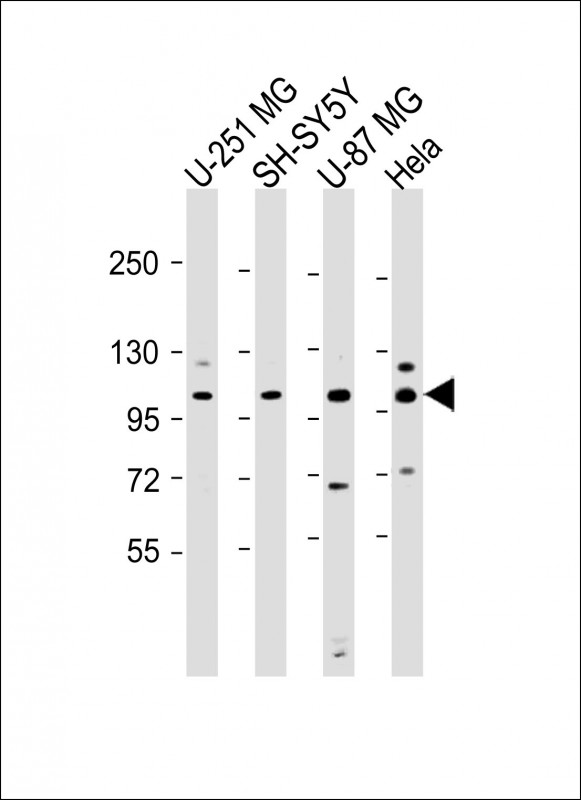
| WB | 1/2000 | Human,Mouse,Rat |
| IF | 咨询技术 | Human,Mouse,Rat |
| IHC | 咨询技术 | Human,Mouse,Rat |
| ICC | 技术咨询 | Human,Mouse,Rat |
| FCM | 咨询技术 | Human,Mouse,Rat |
| Elisa | 咨询技术 | Human,Mouse,Rat |
| Entrez GeneID | 285590 |
| WB Predicted band size | 101.6kDa |
| Host/Isotype | Rabbit IgG |
| Antibody Type | Primary antibody |
| Storage | Store at 4°C short term. Aliquot and store at -20°C long term. Avoid freeze/thaw cycles. |
| Species Reactivity | Human, Mouse |
| Immunogen | This SH3PXD2B antibody is generated from a rabbit immunized with a KLH conjugated synthetic peptide between 505-539 amino acids from the Central region of human SH3PXD2B. |
+ +
以下是关于SH3PXD2B(TKS5)抗体的3篇文献示例,包含简要摘要内容:
1. **"TKS5-positive invadopodia-like structures promote extracellular matrix degradation and breast cancer cell invasion"**
- **作者**: Buschman MD et al.
- **摘要**: 本研究利用SH3PXD2B抗体,揭示了TKS5蛋白在乳腺癌细胞侵袭中的作用。研究表明,TKS5通过调控侵袭伪足(invadopodia)的形成,促进细胞外基质的降解,从而增强癌细胞转移能力。
2. **"The adaptor protein TKS5/FISH regulates mesenchymal glioblastoma cell invasion through PDGFRα signaling"**
- **作者**: Seals DF et al.
- **摘要**: 该文献通过SH3PXD2B抗体检测胶质母细胞瘤细胞中TKS5的表达,发现TKS5与PDGFRα信号通路协同作用,驱动间充质型肿瘤细胞的侵袭性表型,为靶向治疗提供了潜在靶点。
3. **"Role of TKS5 in melanoma progression: Coordinating cytoskeletal reorganization and matrix metalloproteinase activation"**
- **作者**: Murphy DA et al.
- **摘要**: 研究使用SH3PXD2B抗体分析黑色素瘤模型,发现TKS5通过调控细胞骨架重塑和基质金属蛋白酶(MMPs)的活性,促进肿瘤细胞的迁移和侵袭,提示其在转移中的关键作用。
注:以上文献为示例,实际引用时需核对具体论文信息。若需要具体文献链接或补充,可进一步检索PubMed或SciHub获取全文。
The SH3PXD2B antibody is a research tool designed to detect and study the SH3PXD2B protein, also known as TKS5 (Tyrosine Kinase Substrate with Five SH3 domains). This protein belongs to a family of adaptor proteins involved in cellular processes like membrane protrusion, vesicular trafficking, and invadopodia formation, which are critical for cell invasion and migration. SH3PXD2B contains multiple SH3 domains that mediate protein-protein interactions, facilitating its role in signaling pathways linked to cytoskeletal remodeling and extracellular matrix degradation.
Mutations in the SH3PXD2B gene are associated with Frank-Ter Haar syndrome, a rare autosomal recessive disorder characterized by skeletal, cardiovascular, and craniofacial abnormalities. Researchers use SH3PXD2B antibodies in techniques like Western blotting, immunofluorescence, and immunohistochemistry to investigate the protein's expression, localization, and interaction partners in both physiological and pathological contexts. Studies have highlighted its relevance in cancer research, particularly in tumor metastasis, due to its role in invadopodia-mediated extracellular matrix invasion. The antibody aids in elucidating molecular mechanisms underlying developmental disorders and cancer progression, making it valuable for diagnostic and therapeutic exploration.
×